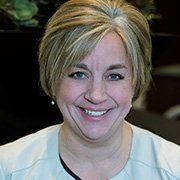Interview
Pursuing better health and better healthcare
Janet Silversmith, MA, CEO of the Minnesota Medical Association
For those who may be less familiar with the MMA, what can you tell us about the organization?
With more than 11,000 individual members across the state – from all specialties, all practice types, and representing diverse opinions and viewpoints – the MMA is the state’s oldest and largest professional association for physicians and physicians-in-training. Among our most distinguishing attributes is our advocacy voice on behalf of medicine – the profession of medicine – not the interests of medical practices, facilities, or other particular business interests.
My favorite fun fact about the MMA is that it is five years older than the State of Minnesota, having been founded in 1853. Although the original purpose of the organization remains intact after 169 years – to improve health and healthcare for all Minnesotans – our current work is focused on the most significant issues and challenges of today.
What can you tell us about ways the MMA has responded to COVID?
From day one, we had two primary goals in mind – to help shape the state’s pandemic response with the perspectives and experiences of practicing physicians, and to help keep physicians (member or not) across the state informed and connected. I’m really proud of the countless ways in which we did – and continue to – accomplish those goals.
There were two very specific things that we did during the pandemic that were extremely well received – we quantified and documented the financial impact of the pandemic on physicians and physician practices, and we launched a public education campaign called Practice Good Health. Through the Practice Good Health campaign, we deliberately leveraged the public’s trust and confidence in physicians and amplified accurate, current, and evidence-based information on how Minnesotans could best protect themselves from the virus, including direct appeals from physicians to mask up and to get vaccinated.
And, like everyone else, the pandemic forced us to do our work in new ways. For us, that meant new ways of reaching and engaging physicians. Some of those ideas, such as our noontime virtual Physician Forums, have been so incredibly popular that we plan to continue them beyond the pandemic.
Aside from the pandemic-related work, what can you tell us about some of the changes that have occurred at the MMA since you started as CEO?
I assumed the CEO role in January 2018, which after the past two years, feels like a very long time ago. I think the most important change in that time has been a new and very clear strategic plan that leverages our unique expertise and defines clear outcomes we want to achieve. Our mission, which I believe in so strongly, is to make Minnesota the healthiest state and the best place to practice medicine. The MMA’s elected physician leadership, through our strategic plan, has fully embraced the dual aims of that mission with specific work to improve community and public health, as well as specific work to improve the environment – both socio-economic and practice setting – in which physicians care for patients.
We’ve also made some internal changes that I’m proud of, such as adding more diversity to our board and elected leadership.
As some of the traditional ways that members used to get involved have changed, and in recognition of how busy our members are, we needed more flexible options for their involvement. One way we responded was with the launch, in mid-2020, of The Pulse, which is a new online policy development and membership polling tool. This tool, which is incredibly easy for members to use, has significantly expanded the number and diversity of members who influence and inform our policy development and advocacy work. In fact, given its ease of use and accessibility, other state medical associations are now working to adopt the tool for their own use.
To remain relevant, every association, including MMA, must embrace change as a constant. As a result, we work very hard to listen to our members, and our prospective members, to understand their needs, interests and concerns, and to involve them directly in our work.
Physicians make a difference every day in the lives of the patients they see.
The MMA is involved in a lot of advocacy work, including legislative advocacy. Please tell us about some of your advocacy priorities.
Yes, advocacy is one of our essential functions. Consistent with our mission, our advocacy has both a public health focus and a medical practice focus. Legislatively, we are involved in a significant number of issues as we work to protect the patient-physician relationship from outside interference, promote public health, and improve access to high-quality, safe, and affordable care.
In 2022, we actively pursued three legislative proposals. One of these proposals, included in the House omnibus health and human services bill, would protect patients who are taking medications for chronic conditions from having their medications and coverage changed mid-year by their health plan. Many health plans and pharmacy benefit managers (PBMs) make frequent changes to their formularies or preferred drug lists as they chase rebates or discounts. These frequent changes mean that many patients who are doing well on one drug must switch to a different medication that may or may not work as well for them. For some, that means additional office visits or lab tests; for others it means delays or gaps in their treatment or, worse, emergency room visits, hospitalization, or other complications. The legislation would continue to allow health plans and PBMs to make formulary changes to manage drug costs but would protect any patients already on such medications from having to switch to another medication until the end of their insurance contract year.
Another 2022 proposal would begin the process of creating an electronic repository for completed POLST (Provider Orders for Life Sustaining Treatment) forms. Many patients with serious, life-limiting conditions have worked with their healthcare team to translate their treatment goals and preferences to a POLST form, which is a medical order. But because it is a paper form, EMS and other healthcare professionals are often unable to easily find the form when called to a patient’s home or when a patient is admitted to a facility. As a result, patients’ preferences may not be followed. An easily accessible POLST repository, as is available in several other states, would help ensure that patients’ wishes are honored.
The final proposal we advanced in 2022 builds on Minnesota’s long-time commitment to patient safety. Patients who experience an adverse event still often complain that they encounter a deny and defend atmosphere and do not receive a complete explanation of what happened. Our legislative proposal would facilitate adoption of the evidence-based CANDOR (Communication and Optimal Resolution) model in Minnesota by protecting from discovery communications and documents that are created for purposes of resolving an adverse event with a patient. The CANDOR process involves immediate disclosure of an adverse event to a patient and/or their family and includes communication with the patient throughout the entire investigation and resolution. The CANDOR process has been shown to improve patient safety, better support healthcare team members involved in the event, and decrease malpractice claims.
I also want to note that our advocacy work extends well beyond the legislature. For example, we work on the regulatory side with state agencies, directly with public and private health plans/payers, with community-based organizations. We are also active in legal advocacy, primarily through the filing of amicus briefs. Some of the recent legal cases we have been involved in include support for the state’s eviction moratorium during the pandemic (Heights Apartments, LLC and Walnut Trails, LLLP v. Tim Walz and Keith Ellison) and support for the City of Edina’s ordinance prohibiting the sale of flavored tobacco products (RJ Reynolds v. City of Edina). Also, in partnership with the Minnesota Hospital Association, we cautioned that mental healthcare in Minnesota could be negatively impacted if physicians and other mental health providers can be held legally responsible for the behavior of any patient for whom they prescribe medications containing a black box warning (David Smits, as Trustee for the Next of Kin for Brian Short, et al., v. Park Nicollet Health Services, et al).
The MMA Foundation is an important part of the MMA. What can you tell us about the foundation and its work?
The MMA Foundation, under the executive leadership of Kristen Gloege, is a critical partner in helping us make Minnesota the healthiest state. Founded in 1958, the MMA Foundation was originally focused on providing low-cost loans to medical students. While the Foundation is still committed to supporting future physicians, today much of the direct funding to students occurs via project-based scholarships to support student research or community service activities. The Foundation recently expanded its statewide reach by launching two grant programs to fund physician-led projects aimed at improving community health or advancing health equity. We also maintain an active physician volunteerism program to help safety net clinics and other non-profit organizations expand access to care. I’m also proud of the Foundation’s work to fund physician-led, suicide prevention training in medical groups across the state. Additional initiatives are in the works for 2022.
What is the MMA doing to address physician burnout?
This is such a critical issue that, for many, has been made worse over the course of the pandemic. Importantly, our work to reduce burnout and support professional satisfaction and well-being recognizes that the factors driving burnout are broad. This is not a simple problem of physicians not being resilient enough or one that can be solved with free yoga classes or pizza. Rather, the factors driving burnout are individual, practice/organizational, and external (e.g., socio-economic, regulatory, cultural). As a result, we are working in all those areas.
To support individual well-being, the MMA offers educational resources and programming, including our annual Reclaim the Joy of Medicine conference. To help address practice/organizational sources of burnout, we have convened wellness leaders and champions from practices and systems across the state to share strategies, lessons, and challenges, and to identify how, together, we can accelerate this work statewide. Finally, our advocacy work addresses some of the biggest external sources of burnout, such as prior authorization.
Health equity initiatives have become part of every health care organization. What are some of the ways the MMA is responding to these issues?
Improved health equity is a key strategic outcome for the MMA, and we have invested new resources to reflect that commitment. We have also been very intentional about defining a focus for our work that leverages our strengths as a medical association. Our three current streams of work are focused on: diversifying the physician workforce; addressing the social drivers of health, particularly housing; changing the culture of medicine – inside the MMA and externally – to mitigate structural racism and implicit bias.
The response and interest in this work has been humbling. We have had so many physicians and trainees volunteer their time and contribute their experiences, ideas, and expertise. Later this year we will be publishing the initial results of an internal historical analysis that we commissioned to examine MMA’s own role in perpetuating or supporting discrimination or racism. I look forward to sharing that report with our members and the community, and I hope it will spark further dialogue about how we can continue to move organized medicine forward. I also hope it might stimulate similar analyses by other organizations.
What are some of the things you’d like to accomplish as the MMA CEO?
The MMA is an organization governed by and driven by its members. So, the most important thing I can do is foster a culture and facilitate the means by which all physicians and physicians-in-training are welcomed, supported, and empowered to raise their voice in pursuit of better health and better healthcare.
As the organization’s first female CEO I am particularly focused on ensuring the organization’s leadership and membership reflect the diversity of Minnesota physicians and trainees. The MMA is not an issue-specific organization or a single specialty organization. As a result, we have rich and vigorous debates about policy and advocacy. I believe that is a critical strength of the organization that needs to be preserved.
Before becoming CEO, I had a long history in health policy, including more than 20 years leading policy at the MMA. Prior to that, I started my career in health disparities research, with a specific interest in disparities among Native Americans. As a result, I’m really proud of the MMA’s focus and increased investment in health equity, and I am committed to seeing this sustained and expanded. I’ve also witnessed a lot of changes in healthcare and have seen how physician support and collegiality has withered. We need physicians to know and recognize that the MMA is a trusted place for physicians to come together, support each other, and bolster the profession.
Finally, I need to give a big shoutout to the MMA’s dedicated and professional staff. Any accomplishments I have made or will make are only possible because of our incredible team.
What would you like doctors to know about how their participation in MMA activities can benefit them and their patients?
There have been many changes in medicine since MMA’s founding in 1853, but physicians tell us that the value of MMA remains largely unchanged – to learn from colleagues, to advance medicine, and to improve the health of patients.
Dr. Charles Mayo once said, “All who are benefited by community of life, especially the physician, owe something to the community.” Physicians make a difference every day in the lives of the patients they see. Through their membership and participation in MMA, they are able to amplify and accelerate that impact.
Janet Silversmith, MA,
is the CEO of of the Minnesota Medical Association.
MORE STORIES IN THIS ISSUE













